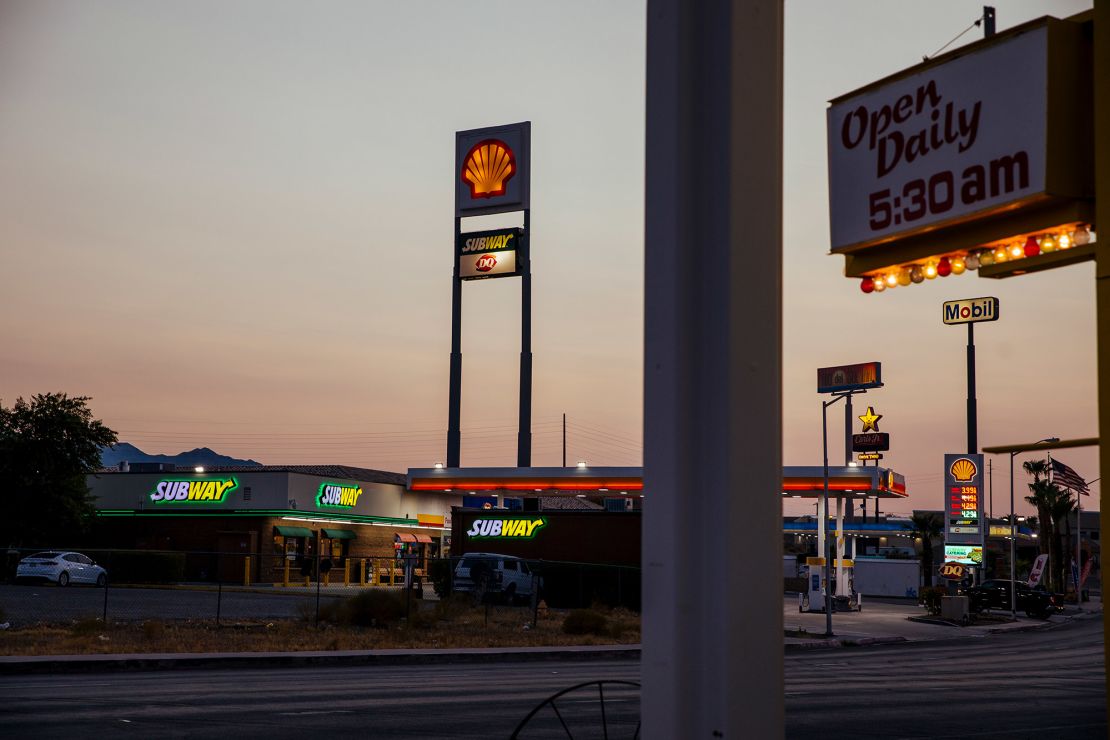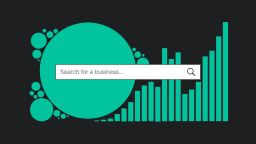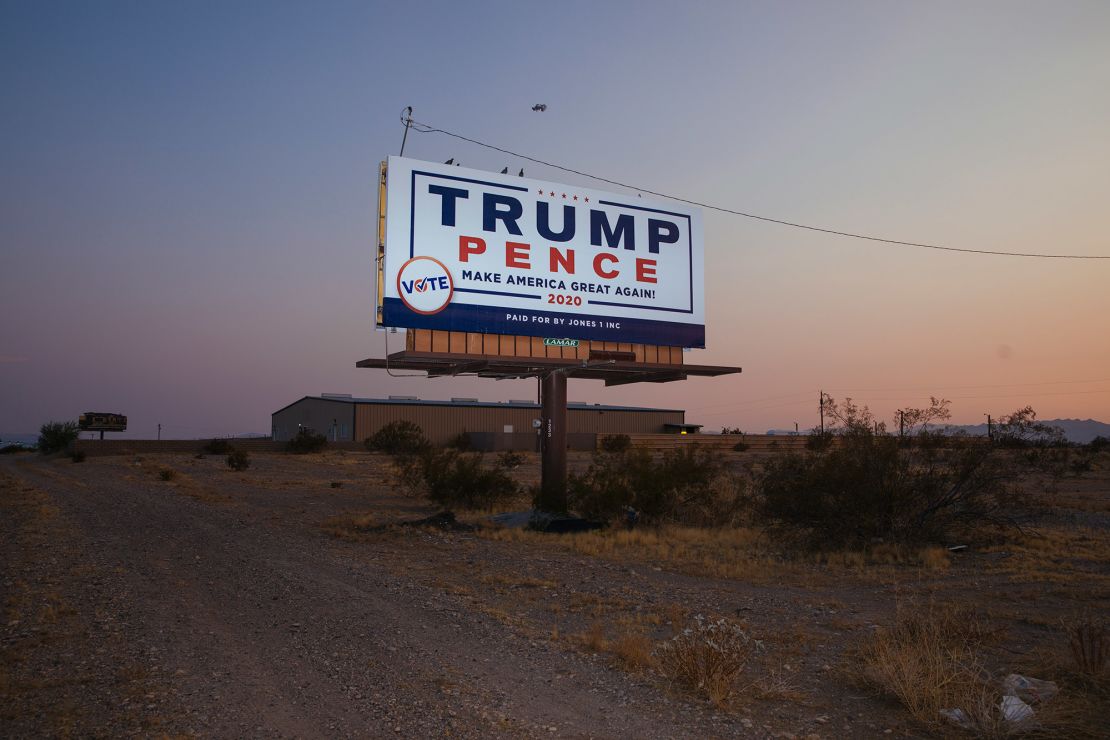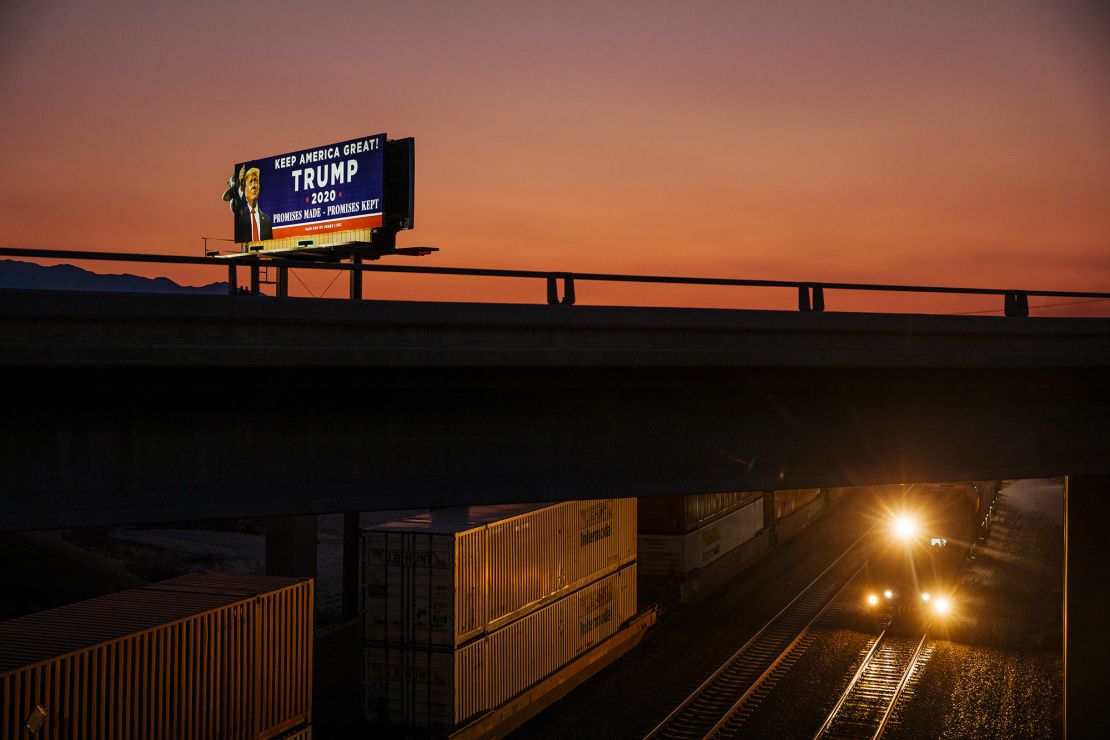The billboards began popping up along a desert stretch of highway in Arizona and California in early August — plastered with “Make America Great Again!” in large capital letters or an image of President Donald Trump looking up to the sky and giving a big thumbs up.
The small company that funded the large billboards had just months earlier received a large cash infusion backed by the same administration now being celebrated, public records show.
Jones 1 Inc. was approved for a loan of between $150,000 and $350,000 at the end of April through the federal government’s Paycheck Protection Program (PPP), which was set up to help struggling small businesses save jobs during the pandemic.
The company, which owns a small Shell gas station and travel center in Needles, California, went on to lease “six beautiful Trump billboards” near the border of California and Arizona, which a local group of Lake Havasu Republicans heralded — thanking “a generous Trump supporter.”

Six political billboards could cost anywhere from around $10,000 for four weeks to nearly $30,000 depending on the location, according to average price estimates provided by Lamar Advertising, which leased the space to Jones 1 Inc. It declined to provide the pricing of the specific billboards. But if they stay up through the election, which the local Republican group that inspired the billboards said is the plan, the costs could range from around $30,000 to around $120,000.

Joseph Jones, the owner of the business, told CNN the PPP money was used for payroll, not for the billboards. His loan application reported that the business employed 32 workers, according to data from the Small Business Administration. Jones declined to provide the total cost of the billboards but said he did not spend anywhere near $120,000. “I simply wanted to support my president, that’s all there is to it.”
Whether or not the money Jones 1 Inc. received through the Small Business Administration loan program was directly used to pay for the Trump billboards, business ethics professors and legal experts said non-essential spending like this violates the spirit of the program, which was meant for small businesses that desperately needed the assistance to keep paying workers. More importantly, they said, this spending highlights failures in how the program was implemented and the confusion surrounding which businesses should have been entitled to the money. It also underscores the need for increased oversight — especially when the government decides which loans to forgive outright.
“If you have enough capital to spend it on billboards, maybe you shouldn’t have been one of the companies to receive this loan,” said Liz Hempowicz, director of public policy at the Project On Government Oversight (POGO), a nonprofit watchdog group. “The responsibility really rested with the SBA and the administration to make sure they were spending these taxpayer dollars in a way that Congress intended.”
Linda Ferrell, a business ethics professor at Auburn University, said companies receiving taxpayer-subsidized funds should have a “social responsibility” to use the money to protect their employees and customers. But like Hempowicz, she said she holds the government more responsible than any one business owner, especially given the uncertainty at the beginning of the pandemic that may have led some business owners to apply for the loans in good faith, before ending up in better financial shape than expected.

Gianna Kraft, creator of the Lake Havasu Republicans Facebook group, said that her members came up with the idea for the billboards, and Jones was the one who stepped up to make it happen. “I’m getting daily pictures, people taking selfies showing their support, people driving by and saying they’re awesome and what a great impact they are having,” she said. “Where are the Biden billboards?” Kraft said, saying these recently installed Trump advertisements are indicative of how much stronger the enthusiasm is for the President than for his opponent, especially in the Lake Havasu area, which will be hosting a boat parade in Trump’s honor over Labor Day weekend.
She said she had no knowledge of whether Jones used PPP money to fund the billboards or how much they cost. “I am not familiar with anyone’s financial affairs.”
The PPP program was the subject of significant controversy in its initial stages after revelations that large publicly-traded companies like Shake Shack and the operator of Ruth’s Chris Steakhouse had received millions of dollars in PPP loans — which they ended up returning. The SBA and Treasury Department issued guidance around the same time reiterating that all borrowers needed to self-certify “in good faith” that the loan was necessary for them to stay in operation.
Based on the rules from the SBA, businesses that falsely certified the loan was necessary to remain in operation and failed to return the funds can face civil and criminal penalties.
PPP funds were lent at an interest rate of 1%, which is far lower than traditional private sector business loans, and will be forgiven entirely if businesses demonstrate they used the money for “payroll costs, interest on mortgages, rent, and utilities” and “at least 60% of the forgiven amount must have been used for payroll,” according to the SBA website.
“I don’t know if it matters if it was the PPP loan money or other money that was freed up by the PPP loan,” POGO’s Hempowicz said about the funds used to pay for the billboards. Even if Jones 1 Inc. doesn’t apply for forgiveness, she said the business is “still benefiting from a hilariously low interest rate that wasn’t necessarily designed to allow small business owners to buy a bunch of billboards.”
Jones would not provide additional information about the circumstances that led him to apply for the loan. He also declined to say whether his company’s financial situation had improved since applying for the loan, or comment on whether he has plans to return the money or apply for the loan to be forgiven.
To date, more than $525 billion in loans was approved through the federal lending program established by Congress during the early days of the pandemic. But many small businesses affected by mandatory Covid-19 shutdowns complained early on about not being able to secure a loan.

The local bank that provided Jones with the SBA-backed loan declined to comment on client information. The SBA also said it couldn’t comment on specific borrowers when asked by CNN whether businesses able to afford large non-business expenditures, such as the billboard purchases, should have been eligible for a PPP loan.
The agency has said more generally that a bank’s approval of a PPP loan does not mean the SBA has determined that company is eligible for the loan and that while only those loans of more than $2 million will be automatically reviewed, all PPP loans are subject to SBA review at any time.
It is common for businesses, both public and private, to get involved with politics — often donating money to political groups known as Super PACs that advocate for specific candidates. There is no limit on independent spending that is not conducted in coordination with political campaigns. But there are disclosure rules for these kinds of “independent expenditures,” and spending of more than $1,000 must be reported to the Federal Election Commission (FEC) within 24 hours. While the billboards state they were paid for by Jones 1 Inc., they do not include the required disclaimer that they were not authorized by a political candidate. FEC records also show Jones 1 Inc. has not reported the spending, and Jones did not comment on this.
The FEC did not comment directly on Jones 1 Inc.’s political billboard spending but confirmed to CNN that it had not been reported.
Businesses that primarily engage in political activities are not allowed to receive SBA business loans under federal law, but this regulation would not apply to a small business like a gas station that is also engaging in political spending.
At first, the Trump administration fought to keep information about who had benefited from the massive government assistance program secret, but limited data was released in July after lawmakers put pressure on the agency and media organizations, including CNN, sued in federal court over the disclosure.
Michael Santoro, a professor of business ethics at Santa Clara University, said there is an inherent conflict of interest because the recipient of a PPP loan in this case is advocating for the reelection of the same administration that oversaw the disbursement of the money.
He said the real question is whether the SBA will investigate this and take action if it identifies improper spending. “Clearly something looks really, really wrong,” he said, “so that’s the SBA’s job to look into.”
Do you have anything to share about Covid-19 in nursing homes? Is there something else you think we should investigate? Email us: watchdog@cnn.com.





